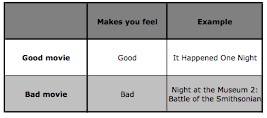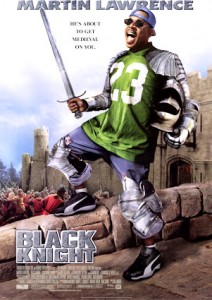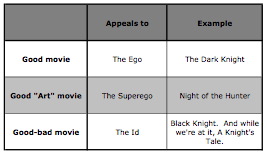Overthinking Cowboy Bebop is on hiatus due to VerhOeverthinking It Week. Don’t worry, it’ll be back soon!
Back in the days when I was a teenager, before I was a hipster and before I had a website, I used to divide movies by their goodness into two basic categories.

Judgements are subjective. If you loved Night at the Museum 2, you are entitled... to... your... Aghk! I can't say it!
This was simple and accurate, and served me well for many years. But then I went off to college, where I contracted that most pervasive and untreatable of viral infections: irony. (And also plantar warts. Kids! Wear flip-flops in the shower every time!) Hardly a week went by in college where I didn’t get together with one group of friends or another to watch a terrible movie for the sole purpose of mocking it. This confounded my system: these movies were terrible, obviously, and yet they made me feel good. Clearly I needed a new category: the good-bad movie. (I am not the first one to think of this, although I probably thought that I was at the time. College students are like that.) And having just taken Psych 101, I made up a new table which divided the movies that made me feel good into three crudely Freudian categories.

For what it's worth, Black Knight is one of the least formulaic time-travel narratives ever produced. Actually, I am willing to go to bat for this movie surprisingly hard.
Some movies are simply good because they make you feel good, thus appealing to the Ego, the part of you that you conceive as you. Then there are art movies – movies that you feel virtuous for enjoying. Let me be clear: I’m not for a second suggesting, as some bitter souls have done, that the people who watch art movies are only enjoying the little thrill of snobbery that comes from liking something you’re “supposed” to like. But I’m also not denying that I do feel a snobbish thrill when I enjoy a certified classic, in addition to whatever enjoyment I’m already getting out of it. Finally, there are movies for the id: movies that appeal to your baser instincts, that you honestly enjoy, but sort of feel bad about enjoying. They tend to have explosions, or beautiful scantily clad actors and actresses, or really, REALLY stupid jokes. And all of these forms of enjoyment – id driven, ego driven, and superego driven – are worth pursuing. Especially since there tends to be some overlap.
So goes the theory. And this scheme did hold up admirably for several years. Sure, it doesn’t even account for movies that I don’t enjoy, but I had pretty much stopped watching those. Once out of college, though, a few things happened that shook the foundations of the system.
1) I started trying to fill in the gaps of my filmic education by working my way through the Criterion collection on Netflix. Most of these I enjoyed… but what about the ones I disliked? 2) In my experience, working a nine to five job makes you much more likely to come home and watch a crappy movie just because it happens to be on TV and you’re too tired to even channel surf. As a result, I started watching movies I disliked again, and I noticed that there seemed to be sever distinct flavors of crap that my system could not account for. 3) I had my first serious encounter with the cinema of Paul Verhoeven.



Verhoeven’s not just “in on the joke”. He is a compelling filmmaker precisely because he is able to straddle different levels of the good/bad/awful divide simultaneously.
For Verhoeven, the concept of “taste” simply does not come into play. And thank god for that.
“lowest abysses of suckitude”…….LMAO!
I must admit, Verhoevan’s ability to just run with the awful is truly a thing of majesty. Starship Troopers is my personal favorite of his works, simply because it realizes so early on just exactly how bad it is… and then rides that for all that it’s worth. Glorious.
@Teddy and DaveW: Trust me, we have plenty more Verhoeverthinking It where this comes from. Stay logged on!
Your scale of movies is absolute genius. We had come up with one that we titled “the absolute value scale,” where a 10 was “so great, you have to see it,” and -10 (negative 10) was “so bad you have to see it.” Easier to explain than yours, but I found your scale to be much more satisfying.
Watch the directors commentary to Starship Troopers. Verhoeven is clearly not in on the joke. In fact, it gets way more hilarious. My favorite line, apart from the fact he got naked for the co-ed shower scene, is the where he tried to blast his critics by pointing out that the movie is critiqued for being about Nazism, when is obviously is about fascism. Obviously.
It IS about fascism though! And not particularly subtle about it either. But still, that’s what I meant about Verhoeven being able to straddle different levels of the good/bad/awful divide simultaneously. He’s perfectly willing to be crass and exploitative and corny while making his point.
I think you’re still missing one critical “liking it” category: the Indie Factor. This is kind of a inverse of the “unenjoyable rarified movie” category. You feel good about not liking it because everybody else DOES like it. A good example of this is Indie Pete from the Diesel Sweeties comic.
I think this appeals to the ego, though, because you feel good and special for hating something popular. For example, I think Zombieland sucks, which puts me at odds with many of my friends, which makes me feel good on a perverse level.
Your tables ignite the happy place in my heart reserved especially for charts and graphs. Lovely. And I really agree with you on the “in on the joke” question. He’s bizarrely aware of what he’s doing and how awful it is, but this sort of weird self-awareness rarely plays well to American audiences, whether in literature, theater, or film. And he has openly and joyously admitted to the absurdity of his characters and their motivations, which is part of what I find so fascinating about him. It’s like he’s obsessed above all with dumping a whole bunch of story elements into one container and seeing what happens — reminds me of the kid with the bug jar we all knew when we were little: “I wonder what will happen if I put this one with these other ones?” Do you think there are other similarly in on the joke filmmakers working in the US today, or does he inhabit this category alone?